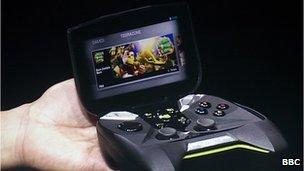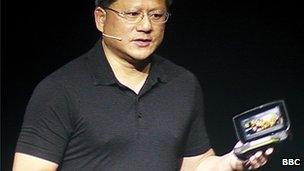CES 2013: Nvidia unveils Project Shield gaming console
- Published

Project Shield resembles an Xbox 360 controller attached to a video display
Nvidia has announced plans to produce its own hand-held video-games console.
Project Shield, external is Android-based and marries a 5in (12.7cm) touch-screen with joysticks, buttons and other controls, in a clam-shell design.
It is also designed to link to PCs offering access to more powerful games such as those on the Steam library.
The announcement was a surprise, as the US company has previously focused on selling chips and graphics cards to other manufacturers.
Intel, another chip manufacturer, is also reportedly working on its own device, external - a television set-top box.
Android apps
Nvidia's announcement came at the first major press conference of this year's Consumer Electronics Show (CES) in Las Vegas.
The company's chief executive, Jen-Hsun Huang, did not reveal a release date or price for the device, but he did show off a working prototype and outline its specifications.

Nvidia's chief executive said the console had taken five years to develop
The console is bigger than an Xbox controller but smaller than the Wii U's game-pad.
Its screen resolution is 720p, but the machine is capable of playing out games and video in the 4k standard - which offers eight times the detail - on compatible TVs via an HDMI cable.
At its heart is the firm's new quad-core Tegra 4 chip - which Mr Huang described as the fastest mobile processor on the market.
As well as keys representing the standard Android commands, the console also sports a "shield" button that takes users to a curated games store featuring titles selected from the Google Play marketplace. However, it can also be used to run other types of apps - Mr Huang gave music players and Facebook as two examples.
Using wi-fi it can also be paired with a computer containing one of Nvidia's GeForce video cards to run PC games. In this case the desktop computer's processors power the software, offering higher quality graphics than could be rendered by the mobile processor.
Mr Huang boasted that "latency was so short it was as if you are connected to the PC" - playing down potential concerns that this kind of set-up might involve a delay between a user pressing a button on the console and the connected PC registering the command.
A demonstration involving titles from Valve's Steam PC platform appeared to bear this out.
However, to avoid such latency issues, users will only be able to connect the console to a PC on the same home network - although Mr Huang said it was an ambition to allow them to go "beyond the house" with future devices.
'Alienated partners'
Nvidia's move takes advantage of the growing number of games being released for the Android and Windows operating systems without it having to develop its own ecosystem - as is the case with the PlayStation, Wii and Xbox families.
However, it will have to convince consumers that they need a dedicated portable gaming console in addition to their other computing devices.
Earlier this year Sony had to cut sales forecasts for its PlayStation Vita hand-held - analysts linked the news to the growth of gaming on smartphones and tablets.
In addition, one industry watcher suggested Nvidia's move would prove controversial with hardware makers that currently use its chips.
"It is a bit of a reach for Nvidia as it does not typically involve itself much with the end-user," said Josh Walrath from the PC Perspective tech site.
"They normally have partners in between. So by doing such a thing you do have to wonder if they're going to alienate any of their really close partners, and if they have the ability to get consumers to buy into it."
- Published12 November 2012
- Published16 November 2011